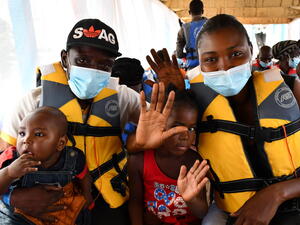Better security needed for Congolese returns, says senior UNHCR official
Better security needed for Congolese returns, says senior UNHCR official

These women in Zambia's Kala camp are among an estimated 380,000 Congolese refugees in the region and beyond.
KINSHASA, Democratic Republic of the Congo, April 20 (UNHCR) - The UN refugee agency's Deputy High Commissioner, Wendy Chamberlin, has embarked on her first field trip to review UNHCR's operations and repatriation prospects in Central Africa.
The six-day mission to the Democratic Republic of the Congo (DRC) and Angola started on Monday, providing the first opportunity for the Deputy High Commissioner to assess UNHCR's programmes on the ground since taking over from Mary-Ann Wyrsch in January this year.
In the DRC capital of Kinshasa on Monday, Chamberlin met with senior officials, including Azarias Ruberwa, one of Congo's four Vice-Presidents under the transitional government introduced in July last year after the Pretoria peace agreements; and Theophile Mbemba Fundu, the Minister of Interior.
Chamberlin welcomed the creation of the National Commission of Refugees (Commission Nationale des Réfugiés) two weeks ago. The Commission will establish a presence throughout the country and work closely with UNHCR, especially in areas of return in south Kivu and Katanga, where about 80 percent of Congolese refugees in Tanzania and Zambia come from. Among other things, the Commission will work with UNHCR on the registration of returnees once repatriation starts.
There are an estimated 380,000 Congolese refugees living in the region and beyond.
Congolese Vice-President Ruberwa, who is heading the Commission for Policy, Defence and Security, assured Chamberlin that everything would be done to make conditions conducive to repatriation to the DRC, including an improvement of security in areas of return in anticipation of the elections planned for June 2005.
The Deputy High Commissioner stressed that in her view, there are three essential pre-conditions for their return. These include the presence of central state authorities in all parts of the country, as well as security and progress toward the holding of elections next year.
"We now have the opportunity to bring Congolese refugees back, but we want to ensure that they come to a safe environment," said Chamberlin. "I appeal to the Congolese government to create the necessary security conditions so that return is sustainable."
This will involve the demobilisation of armed groups - now being undertaken by a newly-appointed national coordinator at the central government level - and the creation of an integrated army.
Some 80,000 Congolese refugees living in villages bordering the Ubangui river, in the north of neighbouring Republic of Congo, could be the first to benefit from a return and reintegration programme, noted Chamberlin, provided the government can reinforce security guarantees for humanitarian activities in northern Equator province, a region formerly controlled by rebels of the MLC (Mouvement de Libération du Congo).
On Tuesday, the Deputy High Commissioner visited Angolan refugees in Napassa refugee site, near Kahemba south of Kinshasa. The site hosts some 1,500 Angolan refugees, with many more settled among the local communities.
She discussed return options for the 7,000 refugees in Kahemba, 90 percent of whom have expressed the desire to go home. However, many of them may have to be patient for a few more months, until conditions improve in their landmine-riddled home area in Lunda Norte, north-eastern Angola. UNHCR is considering opening an office in Lunda Norte this year. Spontaneous returns to the area have also been recorded.
Chamberlin is set to visit Rwandan refugee assembly points in Goma (north Kivu, DRC) on Wednesday, before heading for Angolan capital Luanda on Thursday. While in Luanda, she will meet with various ministers and humanitarian actors. On Saturday she will also visit a reception centre for returnees in Lumbala N'Guimbo, in Angola's Moxico province, near the border with Zambia, before heading back to Geneva.








